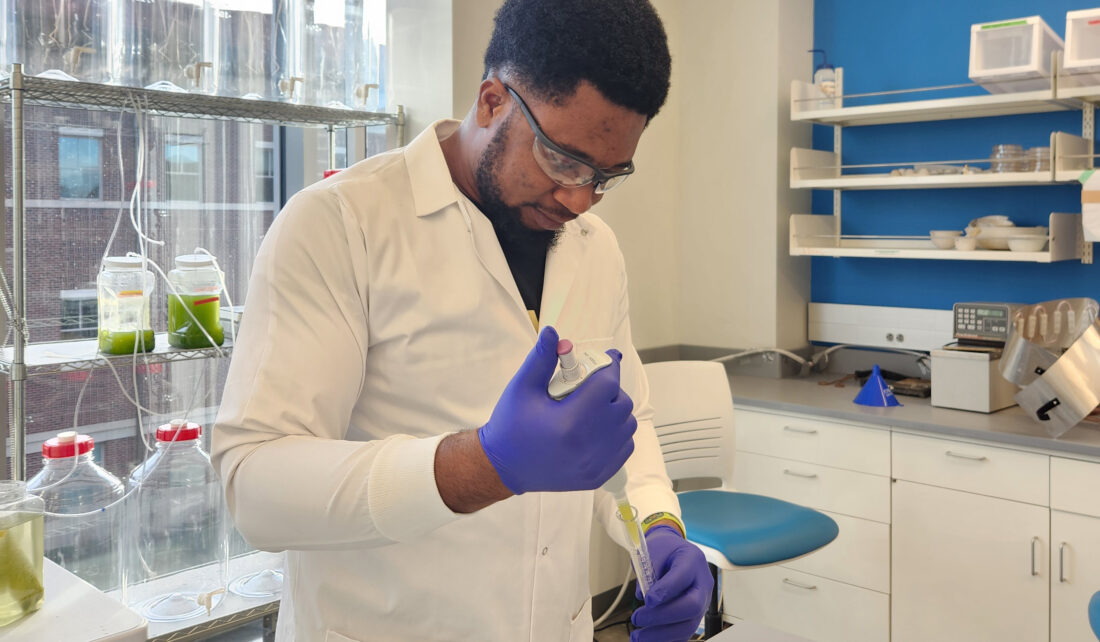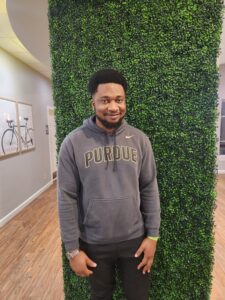
Meet Our Grad Student Scholars is a series from Illinois-Indiana Sea Grant (IISG) celebrating the students and research funded by our scholars program. To learn more about our faculty and graduate student funding opportunities, visit Fellowships & Scholarships.
Christian Chimezie Obijianya is a doctoral student in Purdue University’s Department of Environmental and Ecological Engineering. His current research is focused on water sustainability through reusing treated wastewater for irrigation. His research funded by IISG is based on his master’s thesis that examined the distribution of nitrate in the Mojave Desert. Building on this expertise, this study will use isotopic techniques to better understand the causes of nitrate pollution in the Great Lakes, improving his work on pollution control and water sustainability.
 Nitrogen appears predominantly as nitrate in natural ecosystems, but high nitrate concentrations pose considerable risks to water bodies globally. Excess nitrate disrupts ecosystems, resulting in soil and stream acidification, greenhouse gas emissions, and water eutrophication. These effects change the health of aquatic environments, often leading to hypoxia, a state in which low oxygen levels leave environments uninhabitable for local organisms, making them more vulnerable to disease. The loss of fish and other species due to hypoxia reduces biodiversity and ecosystem services that are necessary to keep nature in balance.
Nitrogen appears predominantly as nitrate in natural ecosystems, but high nitrate concentrations pose considerable risks to water bodies globally. Excess nitrate disrupts ecosystems, resulting in soil and stream acidification, greenhouse gas emissions, and water eutrophication. These effects change the health of aquatic environments, often leading to hypoxia, a state in which low oxygen levels leave environments uninhabitable for local organisms, making them more vulnerable to disease. The loss of fish and other species due to hypoxia reduces biodiversity and ecosystem services that are necessary to keep nature in balance.
Nitrogen contamination is largely caused by human activity, particularly agricultural practices. The increasing use of synthetic fertilizers in agriculture is a major contributor, while fossil fuel combustion accidentally emits nitrogen oxides (NOx) into the atmosphere. NOx can be converted into nitric acid, which then deposits back on Earth, contributing to the nitrogen burden in lakes and rivers. However, determining the exact sources of nitrogen in huge lakes is difficult. This is especially true for southern Lake Michigan, which absorbs nitrogen from agricultural runoff, wastewater discharge and atmospheric deposition. Despite these established sources, their exact contributions to the lake’s nitrate budget remain unknown.
Christian Chimezie Obijianya is addressing this issue using a dual-isotope technique–isotopes are atoms that can be important markers. By analyzing nitrogen and oxygen isotopes in nitrate, he can trace the origins of nitrate in southern Lake Michigan. Through the analysis of distinct isotope signatures linked to each source, this dual-isotope approach has demonstrated efficacy in detecting nitrate sources in various environments.
“This research is of national interest because it addresses important environmental issues that affect the Great Lakes’ ecological health and water quality,” said Obijianya.
_________________________________________________________
Illinois-Indiana Sea Grant is one of 34 Sea Grant programs supported by the National Oceanic and Atmospheric Administration in coastal and Great Lakes states that encourage the wise stewardship of our marine resources through research, education, outreach and technology transfer. In partnership with the University of Illinois Extension, and Purdue University Forestry and Natural Resources, Illinois-Indiana Sea Grant brings science together with communities for solutions that work.

